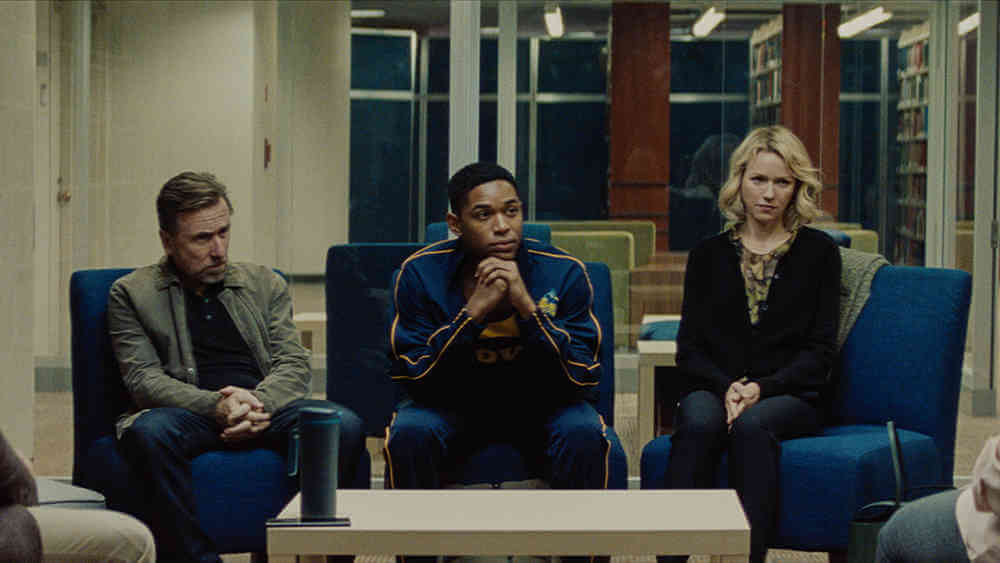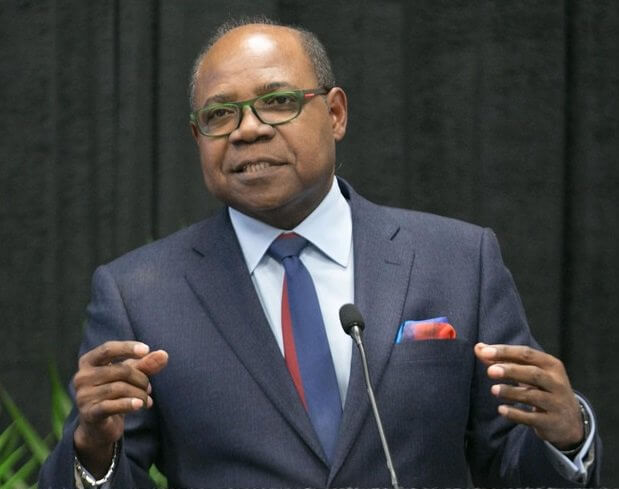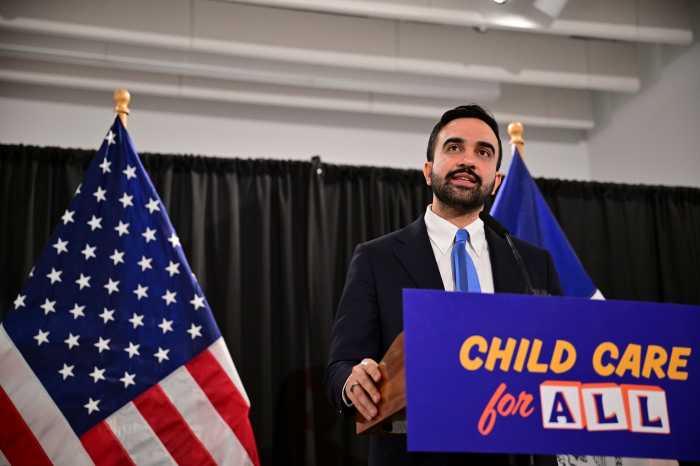Amidst this summer’s cinematic welter of comic book derring-do, “Luce,” directed by Julius Onah and co-scripted by him and prodigious writer JC Lee, stands as a beacon of intelligent, deeply compelling human drama. It focuses on high school senior Luce (Kelvin Harrison, Jr.), a star athlete and debate team captain in Arlington, Virginia. Adopted by lovingly supportive white parents Amy and Peter (Naomi Watts, Tim Roth), he is a privileged lifetime away from his harrowing past as a war-torn African child in Eritrea. But Luce’s near impossibly idealized school image comes into question when his very involved teacher, Mrs. Wilson (Octavia Spencer), discovers fireworks in his locker, shockingly violent political views in an essay of his, and possible culpability in a rape situation involving a Korean student (Andrea Bang) he’s close with. Mrs. Wilson brings all of this into the light, creating an explosive situation, not only for Luce and his family, but the entire school, as well.
Gay City News sat down with Onah and Lee, at the Whitby Hotel last week to discuss their searingly powerful film, the rare kind of movie you see that fills your heart and mind so much you can’t wait to discuss it in depth immediately afterward. The first thing both of them — ultra-smart and hiply funny — wanted to know was when I saw the film because, as Onah said, “We’re so curious to see what reaction was, because as the creators no one’s really honest with us.”
Lee explained that the script was based on a play of his that ran in 2013 at Lincoln Center, adding, “Julius deserves a lot of credit for it. First off, he spent three years chasing me trying to get me to do it and I was saying ‘No, it’s not going to be a film and never will be. You’re out of your mind.’ And then one day he shows up with a 130-page script and I thought this guy’s a lunatic. But I read the script and said, ‘Oh no, he has gotten it.’
“He cracked it open wide enough that it felt cinematic and infused it with an urgency where I was like, ‘Now I understand why this has to be a film.’ I’ve seen a lot of plays get made into a film because people think they can make money off of it and that’s not the right reason to make a film. There has to be a reason why this story will be served by the uniqueness of cinema, and Julius could find that rationale. And once that rationale was there we began working back and forth on building what the script eventually became.”
Onah’s background mirrors that of Luce’s in the film.
“I was born in Nigeria and moved to America when I was ten, and lived in Arlington, Virginia,” he explained. “My father was a diplomat, but when his term ended he left and I began a long immigration process living with my mom and siblings, a big change from being an ambassador’s son to being with a mom who worked at McDonald’s while we lived in subsidized housing. The process took so long that by the time I finished college I had no papers. So I spent almost a year undocumented and got a job busing tables. So the idea of being an outsider was very real to me, and I told JC that it was like he’d peered into my head, and he can also speak of his own experience in terms of navigating identity. We definitely shared an overlap of being constantly in different spaces where we had to put on different masks — trying to figure out what is the acceptable version of ourselves, primarily to white people, that would not just make us accepted but give us the opportunity to thrive and succeed. And the more you start putting these masks on and taking them off, you start to wonder, ‘What’s the real me and what’s the performed me?’ And that is the crux of what Luce is going through as a 17-year-old, with the kind of expectations people had of him, and it is not easy.”
Lee observed, “You know it’s funny because I often talk about how being a queer person of color [half-Chinese], growing up in New York City, I live in a lot of intersections. I grew up very lower class on the Lower East Side. It taught me how to code-switch very early in order to alleviate anxieties in terms of different groups. I think when you grow up gay, you learn how to see certain groups of people, thinking, ‘I’m going to make you comfortable so you don’t attack me.’ I think that Luce has all of that. What he’s trying to do is use that to his advantage, and then it all sort of goes awry. That was the genesis of it all — we both shared a unified vision of trying to tell a story that contained all the multitude of the characters’ complexities but then didn’t offer you an easy way out at the end.”
Onah added, “When you watch or see somebody or even in the newspaper when you read about something, at the end of the day you have your own internal biases and your own critical faculties, but you never have the full picture and yet you have to arrive at some sort of conclusion. That’s what I loved about the play, that it’s trusting the audience enough to do that. We’re having this conversation in this country at this moment right now about who gets to be human and who gets to have full access to the full spectrum of humanity. Who gets to have full moral consideration and at the end of the day, that’s not just some high falutin’ ideal: it’s lived on, on the ground level of every interaction we have. It’s a constant ongoing project, and I think what was brilliant about what JC did with the play and I think what we were trying to honor with the movie was to make sure we were asking that question because I think the questions are the answers.”
For a so-called small indie, “Luce” boasts one powerhouse of a cast, which all started, according to Lee, “with my relationship with Octavia Spencer. I had been very good friends with Octavia’s agent at the time, and we had worked together on some other projects. Octavia and I were developing a television project together. So I had just met her and sort of fell in love with her, as everybody does, because she’s so incredible. I said to Brian, her agent, ‘Do you think she would like to read our script?’ And Brian was like, ‘Send me the script and I’ll see.’
“Brian read it in a day and said, ‘I’m going to send this to her tonight.’ That was a Friday. Sunday night I get an email that’s like full of exclamation points from Octavia and I said, ‘I think this is a good sign everybody!’ And then Octavia and I had literally a five-minute conversation in which she said, ‘I know this woman,’ and when Octavia Spencer says that to you, you’re done. So then I had to ask some bullshit further questions, pretending that I knew what I was doing [laughs]. Amazing!
“And Naomi was somebody I had in mind just from a writing standpoint, because I’ve been in love with her since ‘Mulholland Drive’ — her performance in that movie is just so fucking brilliant. So we sent her the script and fortunately she said yes. Then Tim came along, and then the real trick was trying to find someone who could play Luce.
“Kelvin Harrison, Jr., had done a few movies and gotten a bit of acclaim for a small movie that Trey Edward Schults had done, but this is his first kind of real lead, and he had to go toe to toe with Octavia, Naomi, and Tim. He was terrified, but he did this incredible audition. JC saw the tape of it and I had breakfast with him at La Brea Bakery. JC says, ‘That’s where Julius springs all his traps [laughs] — but I fell into Kelvn’s trap, in reality. He was asking all these questions and was very shy and very soft-spoken and it seemed as if he didn’t understand the character. But he was punking me: he got all the information he needed and when he sent his audition tape, it was unbelievable.”
Lee recalled, “Julius called me into his office to watch the tape. Kelvin did the scene where he tells Naomi, ‘I only get to be either a monster or a saint.’ The nuance with which he navigated that tape, with him looking straight at the camera, I mean I lost my breath. I still get chills when I think about it because you were looking at someone who was so gifted beyond his years. And you’re thinking, ‘This kid is going to be the biggest star in the… he’s so incredible!’ I literally was looking at Julius after the tape and said, ‘He’s gonna do our movie? He wants to be in our movie?! Put him in the movie! What are we gonna do?’
Every facial expression, gesture, movement, and word of his was all processed through this phenomenal machine he is as an actor.
“Part of the inspiration for ‘Luce’ while I was writing it came while Obama was president and Ta-Nehisi Coates wrote this beautiful piece in The Atlantic in which he described the Obamas as walking on ice for eight years and never having slipped. I remember thinking at the time, ‘There’s an emotional tax that he’s paid that nobody mentions, like those moments when Luce is running in our film and you see the tears in his eyes. He’s paying that tax everyday for having to lift everyone up and feel good about themselves. And Obama was good at hiding that tax but the fact is he was paying it.”
Picking up on that theme, Onah continued, “It was the day of Trump’s inauguration, that transfer of power, and there was this image in the White House of Trump and Obama sitting together and I thought, ‘America elected its first black president, this incredible historical symbolic event and gesture that is supposed to absolve us of America’s racism. Yet the person America decides to hand power over to is this human being who negated and questioned and invalidated Obama as a a president, a politician, and as an American. That cognitive dissonance, what did all of it mean?’ So there’s this emotional tax and of course there’s the actual tax on every person in this country who’s coming from a marginalized background, saying, ‘We’re only going to be accepted just so much.’ It’s almost as if we all became a collective joke.”
Lee added, “That cognitive dissonance of the two of them sitting in the Oval Office, that is America and that is what we were so interested in dramatizing and why we never give any easy answers, because that discomfiting feeling of ‘I’m in between the person I agree with and the one I don’t, that space, that gray area is America and we want to believe a story that maybe simplifies it. Actually, the story is far more complicated and nuanced and that’s what we were interested in exploring.”
LUCE | Directed by Julius Onah | NEON and Topic Studios | Opens Aug. 1 | Angelika Film Center, 18 W. Houston St. at Mercer St.; angelikafilmcenter.com | AMC Lincoln Square, 1998 Broadway at W. 68th St.; amctheatres.com | Alamo Drafthouse Cinema, 444 Albee Square W. at Fulton St.; drafthouse.com/theater/downtown-brooklyn

































